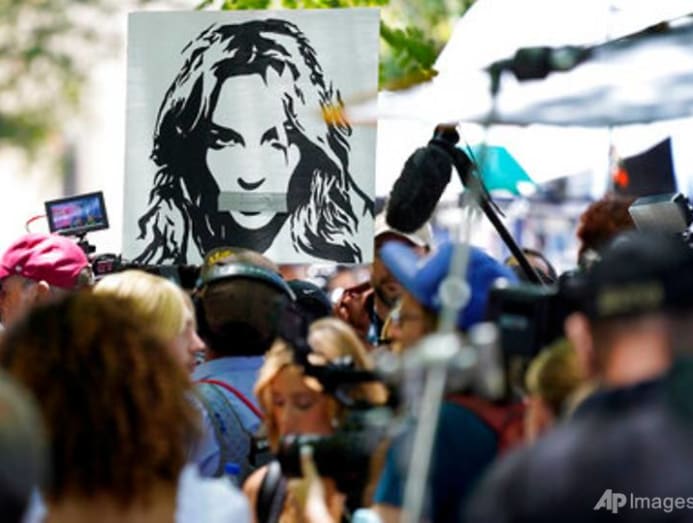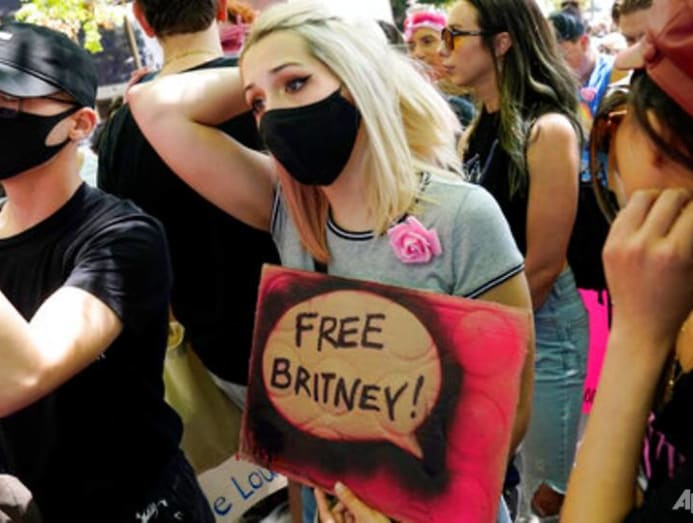Commentary: How Britney Spears was trapped in a web of injustice
While celebrities like Elvis Presley and Michael Jackson were surrounded by yes-men, Britney Spears is surrounded by no-men, says the Financial Times’ Henry Mance.

Under her father's guardianship, Britney Spears swifly returned to performing, including a Las Vegas residency AFP/Ethan Miller
LONDON: There are many villains in the story of pop star Britney Spears.
There are the pundits, who used her for sexual titillation when she was a girl and as a punchline when she was a young woman. There are the paparazzi, who harassed her when she was with her baby. There are ex-boyfriends, hangers-on and us, the demanding fans.
The justice system’s job is to recognise villains, and send them packing.
Instead, for 13 years, courts in California have rewarded Spears’s father Jamie, a failed businessman who struggled with alcoholism, once filed for bankruptcy and who, according to the documentary , was often absent from his daughter’s childhood. They have enabled arguably the most egregious villain of them all.
READ: Commentary: Our unkindness on social media is a mirror to society
READ: 'I want my life back': What Singapore women can learn from Britney Spears’ legal battles
In 2008, when his daughter suffered an apparent mental health crisis, Jamie asked a court to make him her conservator – that is, legal guardian.
He has mostly kept the power since. He has decided which friends she sees, what medical treatment she receives and what happens to her fortune, estimated at US$60 million.
Yet, from the start, Spears made clear that she didn’t want him to have this power. She was prepared to accept a conservator, but not him, her one-time lawyer said in Framing Britney Spears.
The court dismissed her view, deeming her mentally unfit to appoint a lawyer.
Spears is now 39, and for most of her adult life she has been controlled by a man she does not want in that role. She is deemed well enough to perform to thousands, but not to visit her friends.
READ: Commentary: Pop stars used to bare skin. Now they bare their souls
HORRIFYING EVIDENCE
On Wednesday, I listened to the singer break her public silence over the situation to a Los Angeles court.

Her evidence was horrifying. She said those involved in managing the conservatorship, including her father, “should be in jail”; “I would honestly like to sue my family”.
They had made her work seven days a week, taken her credit cards and given her no privacy when undressing. “In California the only similar thing to this is called sex-trafficking,” she said.
They would not let her have an intrauterine device removed, because they didn’t want her to have more kids. But they did allow a doctor to prescribe her lithium “out of nowhere”.
In her younger days, Spears was remarkably composed. On Wednesday, she sounded anxious. “I cry every day,” she said.
When she last spoke in court, she had been made to feel “like I was dead, like I didn’t matter”. This time, she told the judge: “I wish I could stay on the phone with you forever.”
READ: Commentary: When we call people with strange behaviour mentally ill, we reinforce mental health stigma
READ: Commentary: Worries over COVID-19 situation are taking a mental toll on Singapore
GUARDIANSHIP WIDELY ABUSED IN AMERICA
Spears’s story is the converse of some celebrity tragedies. Elvis Presley and Michael Jackson were surrounded by yes-men. Spears is surrounded by no-men.
As a result, her story is more universal. Guardianship is widely abused in the US.
Professional guardians can identify elderly people, with minor health conditions, and tell a court these people are unable to fend for themselves, without even having to inform the subjects or their closest relatives.
Hearings may last only a few minutes. Then the guardian has control of a stranger’s life. They can move them into a care home and sell their possessions to pay for it. The fees roll in.

What is it about the US justice system that produces such flagrant injustices?
This practice was satirised in the film I Care A Lot. One estimate is that 1.5 million American adults, with US$273 billion in assets, are in the hands of guardians.
There are few examples of conservatees escaping the arrangements.
Spears has the unique advantage of devoted fans, the Free Britney movement. The lesson of her case is that courts should pay heed to people with disabilities and mental health problems, whether or not they are famous.
The strongest restrictions should come with the strongest oversight. Right now, if you are vulnerable and asset-rich, the US justice system may not only fail to protect you from the villains, it may well facilitate them.





